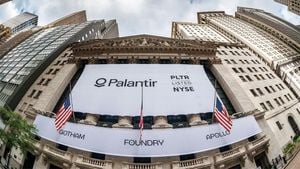The stock performance of Nvidia has taken center stage as the company prepares to release its quarterly earnings. Traders are bracing themselves for potential market volatility, with options traders particularly focused on the upcoming results, which they believe could significantly affect market sentiment.
Recently, the volatility surrounding the S&P 500 has revealed underlying concerns among investors. While the index was close to its all-time high, the Cboe Volatility Index (VIX) indicated rising anxiety, significantly influenced by Nvidia's imminent earnings report on Wednesday.
Brent Kochuba, founder of the options platform SpotGamma, noted, "Nvidia seems poised to move the overall stock market." This sentiment was echoed by others, such as Charlie McElligott of Nomura Holdings, who pointed out the heightened atmosphere of speculation leading up to this key financial decision. The anticipation of Nvidia’s performance has led options traders to hedge against increased volatility, as reflected by the recent spike in the VIX.
Last week, the market observed the largest sell-off since two months, raising red flags. The number of VIX call options surged, indicating traders prepared for significant fluctuations. On the day of the earnings report, traders expect the Nvidia stock to move approximately 7.7 percent, compared to the usual volatility seen post-earnings.
This tumultuous week follows Nvidia's remarkable stock recovery. The company has seen its shares triple since October 2023, bolstered by optimism surrounding artificial intelligence (AI). Nvidia's market valuation now sits at around $3.3 trillion, positioning it as the second-largest component of the S&P 500, which only accentuates the impact of its stock movements on overall market stability.
Analysts have been watching Nvidia closely. The latest results are expected to reveal insights about its new Blackwell chip generation, with many investors on edge over sales performance. If Nvidia underperforms expectations, it could initiate a significant downturn, as reflected by the cautious trading behavior observed going forward.
CEO Jensen Huang recently faced heat after Nvidia lost €600 billion ($660 billion) due to worries stemming from competition with Chinese AI startup DeepSeek. The company’s new model, R1, has caused concern among investors about potential decreased demand for Nvidia's GPUs. Huang, firmly dismissing the panic, stated, "The assumption is wrong. High-performance computing remains irreplaceable for future AI," during his comments from DDN on YouTube.
Despite the initial scare, Huang feels confident about Nvidia's future as the leading provider for demanding AI applications. He highlighted the importance of advanced chips for the continuous improvement of AI models, arguing they would still require immense computational power to achieve peak performance.
Nvidia's market reaction showcased how quickly sentiment can shift. Although the share price dropped significantly following news of DeepSeek's developments, Huang suggested investors may have miscalculated the resilience of Nvidia's position within the industry. Other prominent tech CEOs expressed their support for Nvidia's products, underscoring its foundational role within the rapidly advancing AI sector.
Alongside Nvidia, the Bank of America highlighted several technology stocks well-positioned before their earnings reports, recognizing Nvidia’s recent dip as a potential buy opportunity. The forecast remains bright, with analysts estimating Nvidia's share price targets exceeding the current figures, reflecting their belief in the company’s momentum.
With the earnings report imminent, the spotlight will fall on Nvidia's financials, especially concerning their gross margins. Recent trends indicate possible declines, raising concerns about long-term sustainability if such trends persist. Prior to the report, traders remain on edge as they anticipate substantial swings across the tech market.
The upcoming week is pivotal for Nvidia as it prepares to present its earnings, which will likely set the tone for the market's direction. Investors remain cautiously optimistic, but if the expected earnings fall short, they may face significant repercussions.



